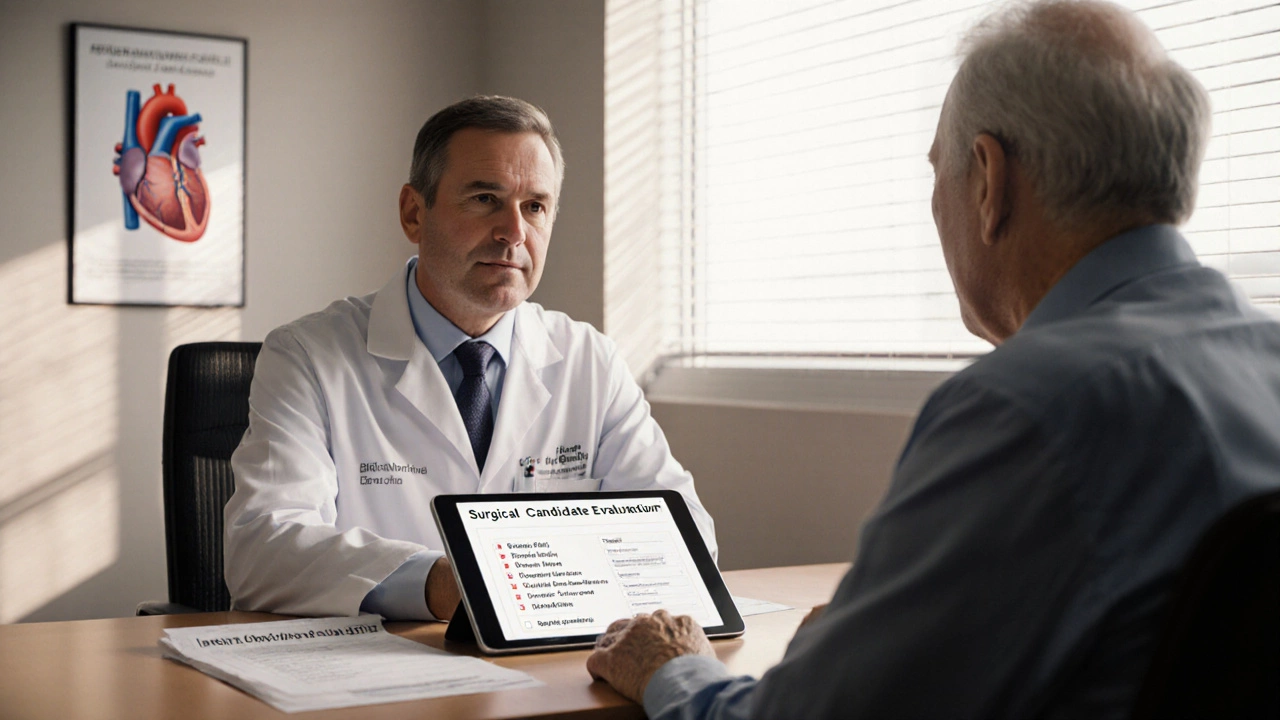Heart Surgery Candidate Assessment Tool
Risk Assessment Results
When doctors talk about heart surgery a set of operations that repair or replace damaged cardiac structures, the first question many patients ask is, "Am I a good fit?" The truth is, not everyone benefits from an incision on the chest. Understanding who falls into the high‑risk group helps you avoid unnecessary danger and explore safer alternatives.
Medical conditions that raise red flags
Some illnesses make the surgical stress outweigh the potential gain. Below are the most common health issues that often disqualify a person from elective cardiac procedures.
- Severe frailty a syndrome marked by weakness, slowed walking speed, and low physical activity. Frail patients struggle to recover from anesthesia and may never regain independence after a sternotomy.
- Advanced age typically over 80 years with multiple comorbidities. Age itself isn’t a ban, but the combination of reduced organ reserve and higher complication rates makes surgery risky.
- Severe chronic lung disease such as COPD with FEV1 < 30% predicted. The lungs cannot tolerate the ventilator pressure needed during open‑heart operations.
- End‑stage kidney disease requiring dialysis or eGFR < 15mL/min/1.73m². Surgery can trigger acute kidney injury that dialysis cannot reverse.
- Uncontrolled diabetes HbA1c > 9% despite medication. High blood sugar impairs wound healing and raises infection risk.
- Active infection including sepsis, untreated endocarditis, or pneumonia. Operating on a body already fighting germs can spread the infection to the heart valves or grafts.
- Advanced cancer especially metastatic disease with limited life expectancy. The benefit window of heart surgery is often shorter than the expected survival.
Heart‑specific functional limits
Even if systemic illnesses are controlled, the heart itself can pose a barrier.
- Very low ejection fraction below 20% indicating poor pump function. The heart may not survive the cardiopulmonary bypass period.
- Severe pulmonary hypertension mean arterial pressure > 35mmHg. The right ventricle can fail under the added stress of surgery.
- Multi‑vessel disease not amenable to bypass where grafts cannot reach all blocked arteries. In such anatomy, surgery offers little advantage over medical therapy.
Psychological and social considerations
Recovery from heart surgery isn’t just physical. Mental health, support networks, and ability to follow post‑operative regimens play a huge role.
- Depression or uncontrolled anxiety may hinder medication adherence and participation in cardiac rehab.
- Lack of a reliable caregiver increases the chance of complications at home.
- Patients who refuse lifestyle changes (smoking, diet, exercise) are unlikely to reap long‑term benefits.
How doctors decide if you’re a good heart surgery candidates
The evaluation follows a step‑by‑step checklist.
- Comprehensive medical history and physical exam.
- Cardiac imaging (echo, cardiac CT, or MRI) to assess valve function, coronary anatomy, and ejection fraction.
- Risk scoring using tools like the STS (Society of Thoracic Surgeons) score or EuroSCORE II.
- Review of comorbidities: kidney function, lung capacity, diabetes control, and infection status.
- Discussion of frailty using gait speed or grip strength tests.Psychosocial assessment for support systems and mental health.
- Shared decision‑making: surgeon, cardiologist, and patient weigh benefits vs. risks.
If the sum of these factors crosses a predefined threshold, the team may recommend percutaneous alternatives, medication optimization, or palliative care instead of open surgery.
Comparison of common contraindications
| Condition | Usually a Contraindication | Possible Exception (with justification) |
|---|---|---|
| Severe frailty | High peri‑operative mortality | When the blockage threatens imminent death and reversible factors exist |
| Advanced age (>80) | Reduced organ reserve | Excellent functional status and low STS score |
| End‑stage kidney disease | Risk of dialysis‑dependent failure | Kidney transplant planned concurrently |
| Uncontrolled diabetes (HbA1c >9%) | Poor wound healing | Rapid pre‑op glucose optimization program |
| Active infection | Potential graft seeding | Infection localized and fully treated before surgery |
| Severe pulmonary hypertension | Right‑heart failure during bypass | Targeted pulmonary vasodilators used peri‑operatively |
| Low ejection fraction (<20%) | Inadequate cardiac output | Mechanical circulatory support available |

Alternative routes for high‑risk patients
If you fall into any of the high‑risk categories, don’t feel locked out of treatment. Modern cardiology offers less invasive options:
- PCI (percutaneous coronary intervention) - stent placement through a catheter, ideal for single‑vessel disease.
- Transcatheter aortic valve replacement (TAVR) - valve implantation without opening the chest, used for many elderly patients.
- Hybrid procedures - combining limited surgery with catheter‑based techniques.
- Medical management - optimized drugs, lifestyle changes, and cardiac rehab can extend life when surgery isn’t feasible.
Next steps if you’re unsure about suitability
Take these actions to get a clear picture:
- Gather recent lab reports: kidney function, HbA1c, lung spirometry.
- Ask your cardiologist for a copy of the latest echocardiogram.
- Schedule a multidisciplinary heart team meeting - most major hospitals now have a panel that reviews high‑risk cases.
- Consider a second opinion, especially from a center that performs transcatheter procedures.
- If surgery is ruled out, ask about enrollment in a cardiac rehab program right away.
Frequently Asked Questions
Can an 85‑year‑old ever be a candidate for heart surgery?
Age alone isn’t a deal‑breaker. If the person is physically active, has a low STS risk score and no severe organ failure, surgeons may proceed, often opting for less invasive techniques like TAVR.
What is the difference between frailty and simply being ‘old’?
Frailty measures functional decline - slow walking speed, weak grip, weight loss - regardless of age. A 70‑year‑old who runs marathons is far less frail than a 60‑year‑old who can’t get out of a chair.
If I have kidney disease, is dialysis required before surgery?
Only if the kidneys are already on dialysis. For moderate chronic kidney disease, surgeons focus on protecting renal perfusion during bypass and may adjust medication dosages.
How does uncontrolled diabetes affect wound healing after heart surgery?
High blood sugar impairs white‑blood‑cell function and collagen formation, leading to higher rates of sternal wound infection and longer hospital stays. Tight glucose control before and after the operation reduces these risks dramatically.
Are there any circumstances where active infection is not a blocker?
If the infection source can be fully eradicated before entering the operating room - for example, a treated dental abscess with negative blood cultures - surgeons may proceed, but only after a waiting period and confirmation of sterility.
